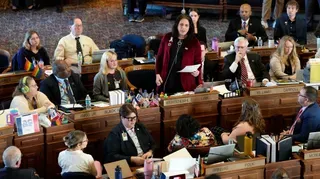April 12, 2011
Restrictions on Organs from HIV+ Donors to be Relaxed?
Kilian Melloy READ TIME: 4 MIN.
Some doctors are advocating for a partial reversal of a blanket ban on organ transplants using tissue from HIV+ donors, the Baltimore Sun reported on April 11.
Physicians at John Hopkins argue that there's no medically sound reason not to allow HIV+ donors to provide organs for HIV+ recipients.
"If this legal ban were lifted, we could potentially provide organ transplants to every single HIV-infected transplant candidate on the waiting list," noted Johns Hopkins University's Dorry L. Segev, an associate professor at the university's school of medicine.
Researchers at the university have determined that such a partial repeal of the blanket ban could make as many as 500 new donors available each year.
The article noted that the ban was built into a 1984 law, the National Organ Transplant Act. Since that time, however, medical advances have allowed patients living with HIV to manage the disease and prevent HIV infection from progressing to AIDS, the syndrome in which the body's immune system is destroyed and opportunistic infections can easily ravage a patient.
If HIV+ donors were allowed to contribute organs to HIV+ recipients, that would allow for HIV- patients to benefit also, because the total number of donors would rise. Donated organs from HIV- individuals could be used for either negative or positive recipients, but organs from positive donors would only go to positive recipients--in theory, promoting the chances for HIV- patients waiting for organs to become available.
The article noted that early indications of success rates for HIV+ and HIV- patients indicate that success rates are comparable between the two groups.
The study, carried out by Segev and others, determined that approximately 500 potential donors, at least, are denied each year. Segev and his Johns Hopkins colleagues are not alone in pressing for a revision on the ban's terms; the state of Illinois passed a law to allow for such procedures, but that law never took effect because the federal law supersedes it.
Others counsel caution. The HIV Medicine Association's chair, Kathleen Squires, of Philadelphia's Thomas Jefferson University Hospital, supports rolling back the ban enough to complete additional research.
"The whole concept needs to be studied to see if the transplants can be done safely and effectively," Squires told the newspaper. "I'm sure some people would ask why anyone would even think of doing that, but there is a clear reason, there's a shortage."
Even with the ban in place, there is some evidence that transplants between HIV+ individuals might make sense. Such transplants have been done in Africa, reported the New York Times in an April 11 article, and they have worked out well. But, the same article said, some HIV+ recipients in the United States have seen their donated organs fail sooner than similarly transplanted organs received by HIV- patients.
Still, the New York Times noted, the success rate in South Africa has been noteworthy: in Cape Town, Dr. Elmi Muller has performed a number of such transplant surgeries, and only one patent had rejection issues.
Moreover, the article pointed out, no such restrictions are in place to deny donors with hepatitis C from contributing their liver tissue to others with the same disease.
In the event that HIV+ donors are some day allowed to provide organs for other HIV+ people needing them, the organs will likely only be harvested from donors once they have died, since people living with HIV are at a greater risk of organ failure.
As for one day repealing the ban completely and allowing HIV- patients to receive organs from HIV+ donors, Segev and others envision situations in which the risk of transmitting the virus would be overshadowed by imminent death without a transplant.
"Times have changed," Dr. Gregory W. Rutecki said, the Baltimore Sun article reported. "Those with HIV are living long and very productive lives, and those that have received a transplanted organ are doing very well. Changing this rule would be a phenomenal decision," Rutecki added, "and would only be controversial among lay persons who don't keep up with treatment of HIV."
The risk is real and should not be discounted, however. A kidney recipient contracted HIV following a 2009 transplant from a donor who had tested negative, but who had had unprotected sex in the interim. In that case, the gap between the donor's testing and the transplant was about three months. The donor remained unaware of his HIV status until a year later; the recipient learned of her positive status when she developed AIDS, the disease's progression possibly helped along by the immuno-suppressants she took to minimize rejection risks.
Health officials learned a valuable lesson from the situation. "The most sensitive test needs to be done as close as possible to the time of transplant," said the New York City Health Department's Dr. Colin Shepard.
"I don't want to minimize living with H.I.V, but it is a medically treatable disease now," United Network for Organ Sharing's Charlie Alexander told the New York Times. "In certain cases, I think it would be medically appropriate."
On top of everything else there's a lingering sense--unfair as it might seem-that HIV+ individuals should not be given organs from HIV- individuals. Only ten years ago, Lambda Legal won the right for HIV+ patients to be organ transplant recipients, the Baltimore Sun noted.
"It wasn't a slam dunk at the beginning," Lambda Legal's Scott A. Schoettes told the newspaper. "And it lingers a decade from when the first transplant occurred."
But the need is real, and it remains pressing. The New York Times quoted one HIV+ patient in need of a kidney.
"There's a stigma about transplanting us to begin with, with some people saying why should an organ be quote unquote wasted on us," said the patient. "So if we can help each other it would make things much better for us. If I need a kidney transplant to survive, then so be it."
Kilian Melloy serves as EDGE Media Network's Associate Arts Editor and Staff Contributor. His professional memberships include the National Lesbian & Gay Journalists Association, the Boston Online Film Critics Association, The Gay and Lesbian Entertainment Critics Association, and the Boston Theater Critics Association's Elliot Norton Awards Committee.






